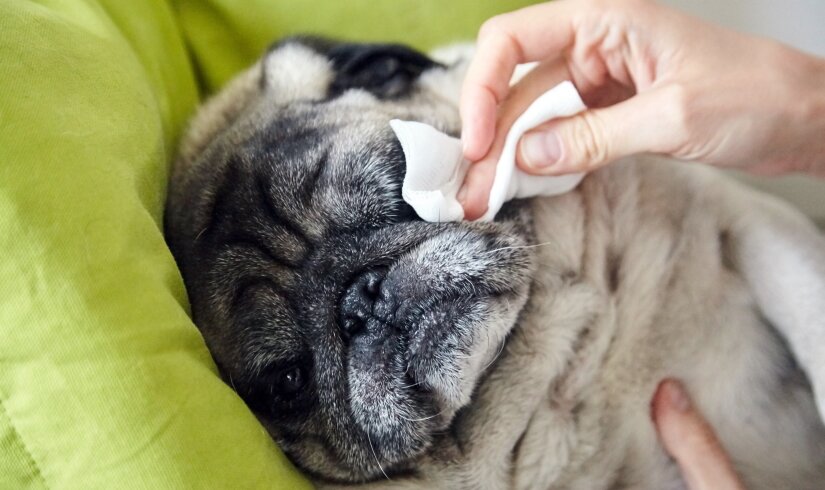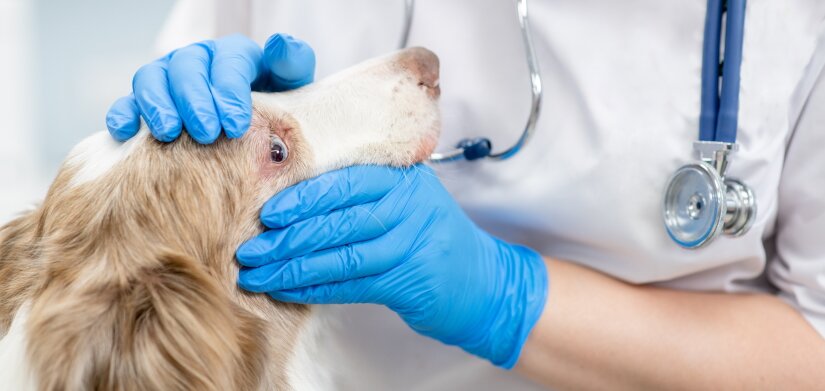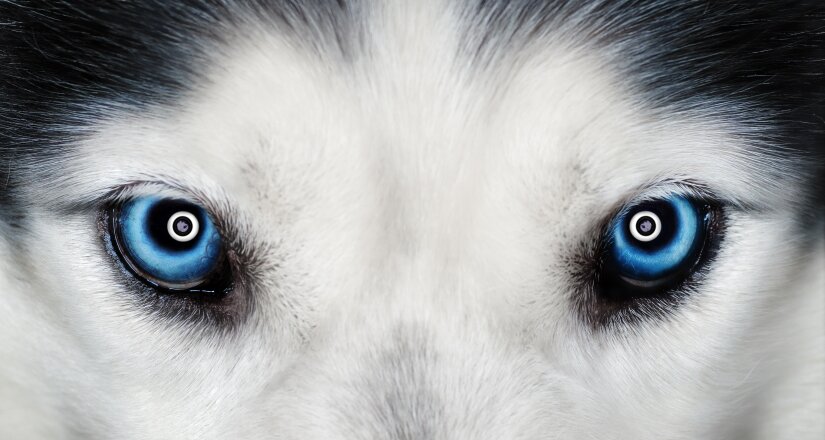Learn about common eye issues in dogs like dry eye, eyelash problems, conjunctivitis, glaucoma, uveitis and corneal abrasions. If your pup has been rubbing his eye or is pawing and showing signs of irritation and pain, you should visit your vet as soon as possible.
Eye conditions can become serious fast. Learn more about these conditions and how you can use four home remedies for less severe issues. In this blog, we’ll discuss eye infections in dogs and how to treat less extreme conditions with four home remedies. The take here is that you should always visit your veterinarian for the first signs of an eye infection and discuss these four remedies with your vet before using them.
The Eyes
Numerous problems can affect your dog’s eyes. These include trapped foreign objects like seeds, dirt, other debris; conjunctivitis, mucous or teary discharge; eye swelling or crusting; itching, bulging, or sunken eye.
If you suspect that your dog has an eye infection, seek veterinary help right away. Left untreated, an eye infection can lead to vision loss or can spread. Eye infections are similar to the ones humans have and most times will need veterinary treatment.
You know that bacteria is the most common cause of a dog eye infection, followed by viral and fungal infections and other diseases, leading to blindness if not treated quickly and adequately. Always call your vet when you see signs of an eye infection in your dog, like redness, squinting, excess tearing, and blinking.
The simple home remedies and preventive steps you will read about are the best alternatives to protect your dog’s eyes from all the possible dangers, diseases, and discomforts of an eye infection. Ensure that your dog isn’t allergic to any of the ingredients used in home remedies by testing first on a patch of your dog’s skin for an allergic reaction.
4 Key Home Remedies to Help Prevent a Dog Eye Infection
- Salt and Warm Water: There is nothing easier than getting into the habit of dipping a cotton ball in warm saltwater and wiping around the outside of your dog’s eyes daily. This cleans away debris and helps prevent bacterial infections.
- Supplements: Check with your vet and use the highest quality supplements that boost your dog’s immune system to keep your dog healthy and fight off disease.
- Chamomile Tea Bag: After you’ve had your morning or afternoon tea, you can use a chamomile tea bag to gently apply to your dog’s closed eyes to relieve redness or clean around the edges of your dog’s eyes to prevent a dog eye infection.
- Trim Hair Around Your Dog’s Eyes: Use blunt scissors and point away from your dog’s eyes. Your dog’s hair can irritate or scratch your dog’s eyes and continuously cause minor infections that you can eliminate by keeping your dog’s hair short around his eyes, eyebrows, and face.

When you keep a watchful eye on your dog’s eyes every day, also be aware of these typical dog eye infections and call your vet immediately.
Dry Eye (keratoconjunctivitis Sicca): This is mostly seen in dogs and is a condition affecting the cornea and conjunctiva of the eye resulting in inadequate tear production.
Signs include: Green mucoid buildup in and around the eyes affected with KCS. The lack of sufficient tear moisture also predisposes the cornea to damage and ulcers. KCS has numerous causes and may be an inherited trait.
These breeds include the following:
- Schnauzers
- Cocker Spaniels
- Bulldogs
- Yorkshire Terriers
- Beagles
There are other causes like canine distemper, sulfa drugs, diabetes mellitus, hypothyroidism, and autoimmune diseases. Your vet will do tear flow tests to determine the amount of tear flow production.
Treatment is usually tear replacement drops, with tear replacement ointment. If your pup has an eye infection as well, antibiotics and an anti-inflammatory may be prescribed. Sometimes surgery is needed, which involves repositioning a duct from the salivary duct to the affected eye’s corner.
Conjunctivitis: Pink eye is the inflammation of the thin, transparent mucous membrane lining the inner portion of the eyelids and the front part of the sclera. Pink eye happens when the conjunctiva reacts to any injury resulting in swelling and secretions. Conjunctivitis in dogs is one of the most common causes of red eyes in dogs and cats.
Other signs include the following:
- Discharge
- Swelling
- Pain
Causes can be irritation from an allergy, virus-like canine distemper, contact with dirt and dust, or bacterial infection that is either primary or secondary to the causes. That said, it’s essential not to ignore these symptoms and to visit your vet right away.
Parasitic conjunctivitis happens when a small nematode lives in the conjunctival sac. This causes a discharge and spasm of the eyelid. There is also tick-related conjunctivitis like rickettsia that also causes swelling and redness with small hemorrhages and discharge.
Your vet will treat or eliminate the underlying causes and also treat the inflammation. Ophthalmic drops or ointments containing steroids help reduce inflammation, and ophthalmic ointments with antibiotics are prescribed for bacterial eye infections. Sometimes both are prescribed together.

Corneal Abrasions/Ulcerations: These are treated in the same way that ulcerations are treated, but your vet will need to observe if there is worsening of the condition. If your dog has deep ulcers that don’t respond to standard treatment, your vet may surgically free and extend a portion of the thin conjunctiva over the ulcer.
Inflammation and cornea swelling with slow healing sores can occur on the cornea’s surface, or they may be more profound. To detect small ulcers, your vet may use specialized dye in the eye. Treatment may be as follows:
- Topical antibiotics and correction of the causes.
- Atropine may be used for the loss of movement of the iris and to relieve pain.
- Surgery may be needed for resistant cases.
Glaucoma: This is a blockage or extra pressure on your dog’s eye that can cause blindness. Dogs like pet parents can develop glaucoma. This occurs when there is an imbalance in the production and drainage of fluid in the eye, resulting in the buildup of fluid and increasing eye pressure to unhealthy levels.
This can be hereditary and may affect the following dog breeds.
- Beagles
- Bassett Hounds
- Cocker Spaniels
These breeds tend to have higher incidences of glaucoma due to the improper development of the drainage angles. There is also a predisposition for lens luxation for numerous terrier breeds.
Uveitis: This is inflammation of the interior of your dog’s eye. This is very serious and can also cause blindness. Anterior uveitis often occurs during the recovery phase of canine hepatitis. Treatment of immune-mediated anterior uveitis may include whole-body corticosteroids and other canine drugs that suppress the immune system.

When severe, the iris and ciliary body’s inflammation may result in pupils contracting and increased protein and cells in the anterior chamber of the eye. There is also low pressure in the eye with a large amount of blood in the conjunctiva, swelling of the iris, and intolerance to light. Veterinary treatment is always needed, and your vet will select the best treatment for your dog’s condition.
Integrative remedies for eye issues in dogs may be as effective as conventional remedies for common eye infections. Bacterial and viral conjunctivitis respond well to oral lysine. Many homeopathic treatments contain healing properties for the eye. Warm green tea bags contain antioxidants and tannins and help soothe mild eye infections.
Healthy eyes in dogs are essential to good vision, so taking care of your dog’s eyes as soon as there is an infection is necessary. It’s also important to always monitor your furry best friend closely to watch for serious eye issues, some of which could lead to blindness if not appropriately treated by a veterinarian. Always get prompt treatment from your vet.
